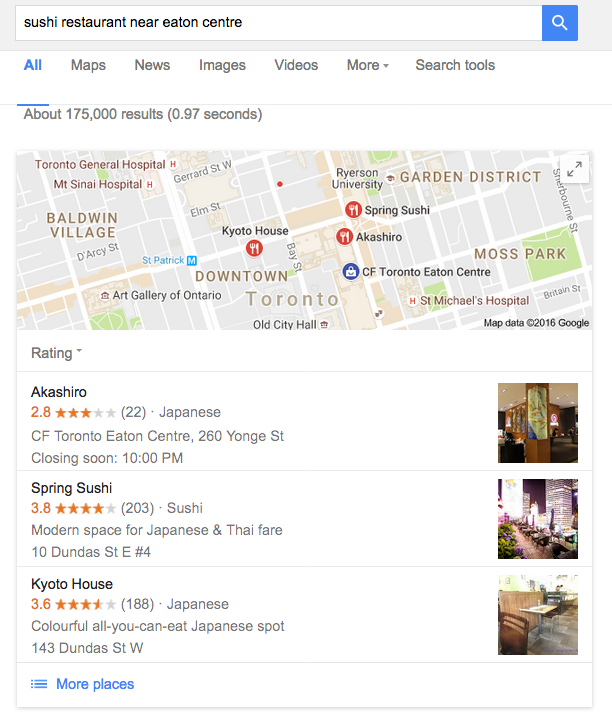Data Markup Strategy for SEO presentation, 2016-11-23 | WordPress Toronto Meetup
Introduction
This post contains the presentation by Robin Macrae at the WordPress Demos, Tips and Tutorials | WordPress Toronto Meetup on 2016-11-23. See the Data Markup Strategy for SEO notes, 2016-11-23 post for the extensive notes for the presentation.
Overview
Schema.org structured data:
- increases organic traffic through higher quality presentation in SERPs but ranking benefit is indirect
- many opinions and predictions on its value and future, few authoritative
- lots of techniques and tools
- makes the case for broader use of structured data in WP
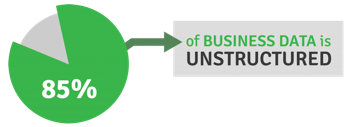 Why it matters
Why it matters
Google will show additional information about your content directly in the search engine results pages via rich snippets so a web pages with a rich snippet can make the content appear more prominently in search results and result higher CTRs and an increase in traffic.
- goal is richer search results to improve user experience
- on-page markup (tags) helps search engines understand the information on web pages and provide richer search results
- Schema.org is a structured data markup schema, a semantic tagging vocabulary, supported by major search engines
- provides a standardized search engine “vocabulary”
- can increase a page’s rank depending on who you believe
Ways to structure data
- microdata, rich snippets
- Facebook has Open Graph
- Twitter has Twitter Cards
- Google+ has authorship
See WordPress kinds of structured data SERP for more.
Three different ways to mark up your data
Use the schema.org vocabulary in one of 3 structured data output formats:
- microdata (uses HTML tags and attributes to define data)
- JSON-LD (JavaScript based)
- RDFa (HTML based)
Examples
Person/organization type
Toronto SEO Guy: No-Nonsense SEO Consulting & Training:

Note JSON-LD format, organization type, Schema.org
logo image, social media URLs, Yoast SEO plugin:
<script type='application/ld+json'>{"@context":"http:\/\/schema.org","@type":"WebSite","@id":"#website","url":"http:\/\/torontoseoguy.ca\/","name":"Toronto SEO Guy","potentialAction":{"@type":"SearchAction","target":"http:\/\/torontoseoguy.ca\/?s={search_term_string}","query-input":"required name=search_term_string"}}</script> <script type='application/ld+json'>{"@context":"http:\/\/schema.org","@type":"Organization","url":"http:\/\/torontoseoguy.ca\/","sameAs":["https:\/\/www.linkedin.com\/in\/TorontoSEOguy","https:\/\/twitter.com\/TorontoSEOguy"],"@id":"#organization","name":"Toronto SEO Guy","logo":"http:\/\/torontoseoguy.ca\/wp-content\/uploads\/2014\/07\/logo.png"}</script> <!-- / Yoast SEO plugin. -->
See also Powered by Search and Powered by Search: rich card.
Other
Official Google Webmaster Central Blog: Rich Cards expands to more verticals: “Users who tap on your Rich Card will be taken near instantly to your AMP page, and be able to swipe between pages within your site.” See restaurant_card_01a_Google_A.gif. (For some reason, that GIF image causes this page to take an inordinate amount of time to load in FF so I removed it. From the link, the image loads normally in FF.)
Schema.org types (data formats)

Here are a few of the many semantic data schema types.
- organization, person
- articles, posts
- products, services
- kinds of content (event, video, movie, recipe, ratings, etc.)
- breadcrumbs (navigation)
- local business
Schema.org‘s list of commonly used types:
- Creative works: CreativeWork, Book, Movie, MusicRecording, Recipe, TVSeries …
- Embedded non-text objects: AudioObject, ImageObject, VideoObject
- Event
- Health and medical types: notes on the health and medical types under MedicalEntity
- Organization
- Person
- Place, LocalBusiness, Restaurant …
- Product, Offer, AggregateOffer
- Review, AggregateRating
- Action
The code
The code that provides the search engines with the data:
- using Articles | Search | Google Developers to view sample markup, JSON-LD and microdata
- Structured Data Testing Tool takes a URL and returns what the SERP would display for the markup in the submitted page
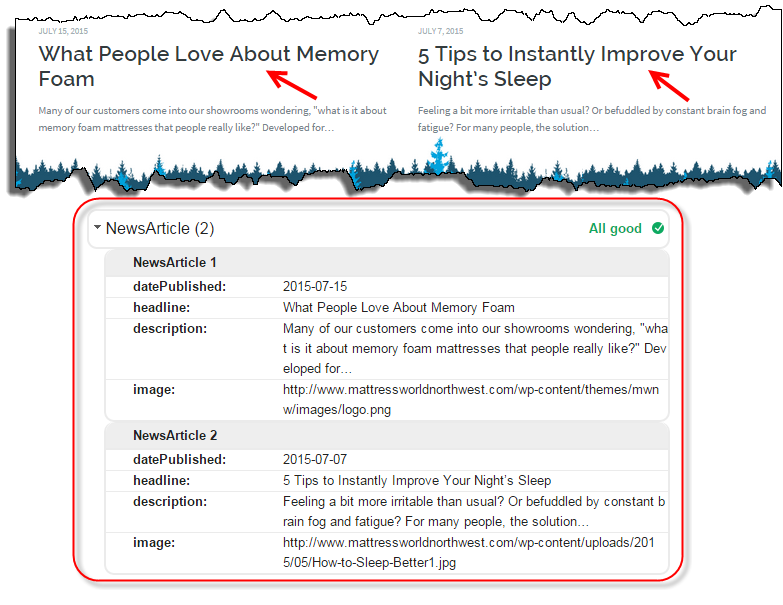
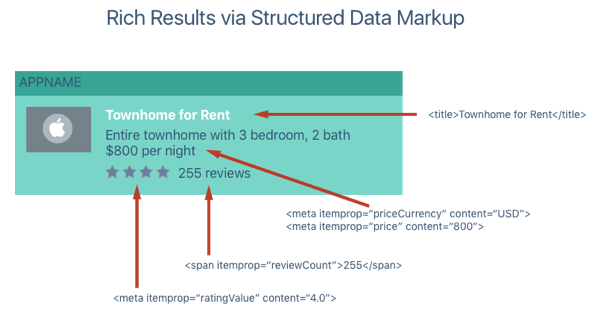
 JSON-LD markup code example
JSON-LD markup code example
From Schema Structured Data – SEO Guide by Raven (General research):
<script type=’application/ld+json’>
{
“@context”: “http://www.schema.org”,
“@type”: “product”,
“brand”: “Raven Tools”,
“name”: “Site Auditor”,
“image”: “https://raventools.com/img/og-raven.png”,
“description”: “Site Auditor analyzes your site to find all of the SEO issues that may be keeping your site from ranking on search engines.”
}
</script>
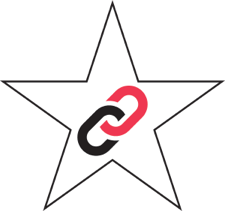 Google site and tools
Google site and tools
- guidance on using microdata
- wizard to add microdata to a page
- validate structured data on any web page to check that microdata is working
 Plugins
Plugins
- WP SEO Structured Data Schema | WordPress Plugins (6k) JSON-LD format; 5 reasons why the plugin’s developer thinks that it’s best-in-class
- Yoast SEO | WordPress Plugins (1m ) plugin is noteworthy because it enables semantic tagging not only for Schema.org but also Facebook, Twitter and Google+. Note that its Schema.org markup is both limited and a mix of formats.
- WPRichSnippets ($69/yr to $399; Hesham Zebida) is an all-in-one plugin with a variety of options to build rich snippets; for review websites as well as product, organization, or restaurant; Black Friday 50% discount)
Google’s format preference
- Google prefers microdata for web content (s: Markup Helper)
JSON-LD is the recommended format where possible (s: Introduction to Structured Data | Google Developers) - … a summary of the format of structured data markup Google recommends for specific goals (s: Structured Data Markup Formats: Microdata vs JSON-LD vs RDFa | Engage The Crowd (2016-04-18)
- Google is in the process of adding JSON-LD support for all markup-powered features
- conclusion, JSON-LD
 SEO value: the context
SEO value: the context
- 30% statistic from SearchEngineLand’s 2011 post
- contrary view from Searchmetrics research and analysis 2014
- WP plugin developers and SEO practitioners say it improves SEO including ranking
- while Google says that structured data isn’t a direct ranking factor, it has also said that it may become one in the near future
Schema.org & Genesis 2.0 | Yoast Dev Blog (Joost Yoast; 2013) excerpt:
Why implement Schema.org markup?
… Not just Google uses schema.org, all 4 major search engines, Google, Yahoo!, Bing and Yandex use it for several different purposes. … So, in my opinion, schema.org markup is a must for everyone serious about their websites optimization.
 SEO value: conclusions
SEO value: conclusions
- higher CTRs generally means higher ranking
- structured data has a very high correlation (i.e., indirect relationship) with search engine rankings
- significant benefits for some schema types (e.g., products in e commerce)
- conclusion, better presentation from structured data plus indirect effects but no direct ranking benefit
- bonus of faster and more consistent authoring
- logical in that mere structure is not indicative of the content itself but rather a minor measure of its quality like spelling
 Key takeaways
Key takeaways
- SEO value is real and substantial—just not directly in ranking
- sounds complex but tech threshold is low and worth the effort
- Google is the mother ship for resources (no surprise)
- use Yoast SEO if you already have it and supplement as necessary
- think about other uses for structured content
Why keywords?
 Why are keywords important to promoting content?
Why are keywords important to promoting content?
- keywords play a large role in SEO and getting right kind of visitors
- user search queries are largely keyword-based, express intent
- they tell us what your content is about or for
- keywords are highlighted in a SER item
- synonyms and related ideas/concepts are relevant
- important in social media
What do you use keywords for?
- META element (deprecated)
- microcontent and titles and headings in particular
- body of content (higher is better, frequency within reason)
- post and page filenames
- keyword stuffing to be avoided
How do you use keywords?
- research
- a topic (what’s it about, concepts, terminology)
- an audience (what are they looking for?)
- writing content
- research before writing
- supplement and adjust in editing
- don’t go overboard with keywords for SEO
- in publishing content, use a plugin
- PPC campaigns
- key component of pay-per-click advertising
- AdWords is the 800 lb gorrilla
- analytics (how is my content performing?
- identify keywords that visitors used (referrer)
- tag keywords to facilitate tracking
Best free tools and services?
What are the best free tools and services for keyword research, management, use and analysis?




